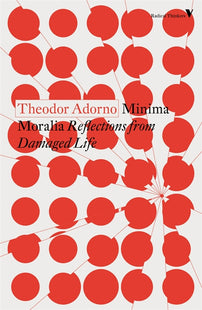Oyer the hills by Theodor Adorno
When we are hoping for rescue, a voice tells us that hope is in vain, yet it is powerless hope alone that allows us to draw a single breath.

As part of our September student reading, we're publishing an excerpt from Theodor Adorno's beloved collection Minima Moralia: Reflections from Damaged Life every day until the end of the month.
All books are 40% off as part of our Student Reading Sale. Ends September 30 at 11:59PM EST. See all our student reading lists here.
Oyer the hills - More perfectly than any other fairy-tale, Snow White expresses melancholy. The pure image of this mood is the queen looking out into the snow through her window and wishing for her daughter, after the lifelessly living beauty of the flakes, the black mourning of the window-frame, the stab of bleeding; and then dying in childbirth. The happy end takes away nothing of this. As the granting of her wish is death, so the saving remains illusion. For deeper knowledge cannot believe that she was awakened who lies as if asleep in the glass coffin. Is not the poisoned bite of apple which the journey shakes from her throat, rather than a means of murder, the rest of her unlived, banished life, from which only now she truly recovers, since she is lured by no more false messengers? And how inadequate happiness sounds: "Snow-White felt kindly towards him and went with him." How it is revoked by the wicked triumph over wickedness. So, when we are hoping for rescue, a voice tells us that hope is in vain, yet it is powerless hope alone that allows us to draw a single breath. All contemplation can do no more than patiently trace the ambiguity of melancholy in ever new configurations. Truth is inseparable from the illusory belief that from the figures of the unreal one day, in spite of all, real deliverance will come.
All books are 40% off as part of our Student Reading Sale. Ends September 30 at 11:59PM EST. See all our student reading lists here.
